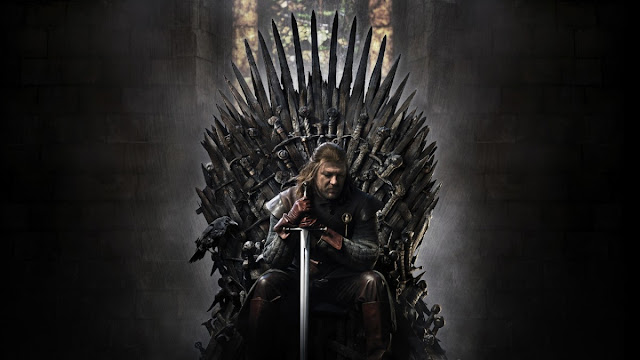Ranking the seasons of Game of Thrones
Updated to reflect post May 19, 2019 thoughts
It is very hard to believe, but we live in a world where we will never see a new episode of "Game of Thrones" ever again, now that its final season has come and gone. As arguments keep going as to how the final season shapes or reshapes the legacy of the show going forward, there is no denying the impact the show had on the television landscape, especially as we keep going deeper and deeper into the binge-watching, streaming TV future. For all intents and purposes, the end of "Game of Thrones is the end of the appointment network/cable TV era, and we may never see its like again.
To mark the occasion, it is time to commemorate the best (and not so best) this series has ever given us, starting with the ranking of all the seasons that have aired. I stand by the opinion Game of Thrones has been mostly great series overall (an argument that took a hit with the final two seasons), and there's a lot to celebrate about it. With that said, some of these seasons have been of “lesser” quality than others, while others have been true standouts. Join us on this journey back to seasons past (and feel free to agree or disagree with the order):
SOME
SPOILERS AHEAD!!!
8. Season 8
Coming in at the very bottom of the list is sadly the show's long gestating, abbreviated final season.
Before I get into the things that land the season at the very bottom, it has to be said: what the behind the scenes crew of directors, set designers and producers were able to achieve with these abbreviated episodes from a production standpoint is nothing short of incredible, as seen in the rather insightful documentary "The Last Watch" that came out the week after the series finale. It was a labor of love from the unsung heroes of the series, and they deserve many accolades for making sure the final episodes could absolutely rival and exceed the production quality of many contemporary movies.
Unfortunately, all the quality seen on the production on screen was let down by the thing that didn't equally keep its end of the bargain: the writing.
Simply put, never has Game of Thrones seen such a divide in quality from its writing to its production values like it saw over in Season 8. Judging everything from the quality of the craft on display, this season would have ranked very highly above the others in that regard, specially considering the manpower it took to do moments like the long awaited Battle for Winterfell (which took 55 grueling nights to shoot), or the final siege at Kings Landing (the crew had to build a city wide set in 7 months to blow it up as seen in the episode). The quality of the spectacle speaks for itself.
But Game of Thrones didn't become the popular show it was due to spectacle. The writing, the thoughtful storytelling, the character development are what made it popular. Because of the abbreviated nature of the season, a lot of these elements were thrown off the window, resulting in a season with hurried story developments which saw the end of the show's internal logic. The show lost a lot of weight in this final season, which led to the massive polarized reception it got.
Still, a "weak" Game of Thrones season can still be compelling, and sure enough, there were enough standout moments within the season to not make it a total loss. The second episode, "A Knight of the Seven Kingdoms", was the last truly great episode of the series, and a reminder of what made the show sing for so long. The aforementioned spectacle mentioned above never stopped providing thrills, and individual moments like Arya saving the world from the Night King were inspired. Unpopular as the opinion may be, I even think the series finale did a good enough job to close the book, despite the turbulent road it took to get there.
It's still sad to think Game of Thrones bowed out of this world on its weakest note, and legit conversations about whether or not it tarnishes the legacy of the show will continue at least until the prequels come out. At the very least, we'll always have the memory of the great moments along the way, as seen with the seasons that preceded it.
7. Season 7
Before Season 8 took the crown of weakest season, Season 7 was the one regarded as the “least” great season of the series. While there is a lot of great things included in this abbreviated 7-episode season (the loot train battle episode, “The Spoils of War” is arguably high up there with the best of the series), it is also a season that began the accelerated pacing problems that reached its nadir by the time the even shorter Season 8 arrived.
While the season did benefit in some ways with some accelerated pay offs in its first few episodes, the pacing really became a hindrance by the time the penultimate episode came on, “Beyond the Wall”. Categorically the show’s most epic episode spectacle wise but also the show’s most epically stupid episode in its entire lifespan, “Beyond the Wall” taints a series that at the time had never delivered an outright bad episode that threw away a lot of the show’s rules and internal logic.
For all that most of Season 8's episodes suffered near the end, the birth of those problems were found in this particular episode and therefore, the season.
6. Season 5
Having the unenviable task of
having to adapt the weaker book entries “A Feast of Crows” and “A Dance with
Dragons” all in one season, Season 5 already had the deck stacked against it,
specially following on the big events from Seasons 3 and 4.
For the most part, Season 5 did a good job on trying to trim the fat plaguing those two books (which didn’t advance the story much due to the overabundance of new characters introduced). But trimming the fat also led to some missteps, like the entire story of Sansa Stark being forcefully married to the monstrous Ramsay Snow (which was a story of an entirely different character in the books), the overbearingly glacial pacing of the first five episodes, and the feeling the show may have been crossing the line of misery in a series that had become famous for it.
But thanks to a strong Jon Snow story that showed us his highest highs and lowest lows as the Lord Commander of the Night’s Watch, as well as a really strong final third of the season that gave us the chilling massacre of Hardhome (giving us a glimpse of what the White Walkers’ threat really is like), the dragon pits fight and a brutally momentous finale, Season 5 ultimately emerges as a backloaded satisfying watch. Even more so when paired with the season that followed it.
5. Season 6
At the time, Season 6 was a huge
inflection point for the series from many different angles. On the one hand,
this season was gonna be the real test bed on how the series could move forward
now that it had passed the books published by George R.R. Martin (something he
still hasn’t finished yet). On the other hand, after a season many felt was a
brutal watch, there was a lot riding on Season 6 to see if there was an end in
sight to the ever-growing parade of misery inflicted on the characters (and in
turn, the viewers), and if the show would ever get close to start delivering
payoffs after years of slow methodical build up.
Whether it was always the design of
the story to take this turn or just TV showrunners making things a little bit
more “TV”, Season 6 is perhaps the most rewarding and cathartic season of Game of Thrones to date. For anyone that
grew disheartened at the events that unfolded in Season 5, the sixth season
gave most characters and stories a reprieve while also paying off longstanding
theories and mysteries the show had for a while (ie. Who is Jon Snow’s mom?).
The
season also delivered some truly standout moments for the series, like the heartbreaking
origin/death of Hodor, the visually striking “Battle of the Bastards”
(featuring an insanely staged medieval battle), and the season finale “The Winds
of Winter”, which might as well be the show’s ultimate masterpiece.
So why is Season 6 not ranked higher?
While all the payoffs were great,
this is where the show started to feel like it was starting to play against
some of its more established rules and conventions. While payoffs are great,
they came at such a significant rate it was hard not to feel like this was
becoming Game of Thrones fan fiction.
While the first run of episodes up to the big Hodor moment in “The Door” were
great, the next three episodes leading to the double punch of “Battle of the
Bastards” and “The Winds of Winter” saw some of the show’s most obvious wheel
spinning, to the point where if you were to rewatch Season 6 and skip from “The
Door” to “Battle of the Bastards”, it wouldn’t feel like you missed something.
While the highs of Season 6 are some
of the highlights of the series, some of its lows hold it back a little bit.
Still, the payoffs offered here are a good reward for long time Game of Thrones fans, and the season
also did a good job of setting the stage for the final two seasons.
4. Season 2
Probably one of the more rewarding
seasons to rewatch thanks to context provided by further seasons, Season 2 is a
lot of fun. It was also a season that took a little bit of time to show its
greatness.
Following the shocking developments of the ending of the first season, Season 2 had the unenviable task
of now becoming a show without a true central “point of view” character, as the
true nature of the sprawling narrative became more obvious now. Most characters
from the first season came back but were more spread out across the world. New
characters were introduced as part of the stories from old characters. Classical
fantasy elements like dark magic finally made its way to the narrative. It was a
lot to take in, but for the most part, Season 2 succeeded for the most part in
handling all the new cooks in the kitchen.
It’s also a season whose
penultimate episode managed to give its preceding 8 episodes some much needed
context. The ninth episode, “Blackwater”, was a true inflection point for the
series early into its run. Considering the sprawling nature of its narrative,
it was bold to center an entire episode on a single location when there was so
much story to tell in other places. It was also bold to see a TV show be able
to portray a large-scale battle like this one on a TV budget, which before this
episode, they were skipping because those things are expensive. It was a great
sign of a show being bold to do more despite its limited reach, while also
serving as a way to give a character enough command to become a series MVP: Peter
Dinklage’s Tyrion Lannister.
It takes its time, but Season 2 ultimately
delivers the goods, with so many seeds planted here that sprout beautifully in
later seasons.
3. Season 1
The one that kicked it all off is
still something pretty special to watch, even knowing how much crazier the
series would get over the years. But in this first year, it is hard not to be
impressed with just how much the first season accomplished not just in establishing
a convincing new fantasy world, but also establishing so many well-rounded
compelling characters from the start. Season 1 was all about character
interactions and exquisite dialogue, expertly written to always suck you in and
also create a sense of history to such a degree, flashbacks were never needed.
This was all anchored by a great commanding presence by main character Eddard “Ned”
Stark, played with understated grace by Sean Bean, which gave the series
a great primary anchor to take you through this new world.
That is, until he got his head
chopped off in the penultimate episode of Season 1.
Despite all the great things that has
defined the show over the years, if there’s been one thing that has become THE
thing that made the show so popular in the first place, was the complete adherence
to subverting established story conventions and the full embrace of an “anyone
can die” ethos. Other TV shows and movies would use the same ethos before, but ancillary
to secondary characters would always be the ones to go, with a main character always
remaining safe. For everyone watching the show for the first time unspoiled and
with no book knowledge, the death of Ned Stark was a huge defining moment on
the TV landscape, and even til this day, it’s the one event that reverberates the
most on the show even on its later seasons.
Ned Stark’s death casts a great
shadow on the story moving forward, and that single event made Game of Thrones fascinating,
unpredictable TV.
2. Season 3
The Red Wedding.
Enough said.
Actually, there is more to say about Season 3 than the incredible moment that closed out its ending episodes. After the end of Season 1 and Ned Stark’s betrayal and subsequent beheading, for non-book readers, if they thought the surprises were done and that justice would be served to the show’s villains by the hand of Ned Stark’s son Robb, they were in for a rude awakening. The journey of Robb Stark’s rise as the King in the North, all the way to his subsequent downfall thanks to his innumerable mistakes made, is a chilling way for the series to show how good characters making bad decisions can cost them dearly, as seen with Robb and his mother Catelyn Stark’s ultimate denouement at the hands of Walder Frey and the ruthless scheming by the Lannisters. This event right here is the reason showrunners David Benioff and D.B. Weiss wanted to adapt George R.R. Martin’s books into TV, and it was a moment so shocking, so horrifying, it solidied Game of Thrones’ place in the TV pantheon. It was a scene that technically couldn’t be done wrong, but it’s good to know they got it right. The numerous reaction videos on its wake are a testament of that.
Even with this event dominating the proceedings, Season 3 also stands out by improvements all around over its first two seasons. For one thing, the show was doing a better job at handling the numerous stories that left Season 2 feeling very bloated for so long. Some of the show’s better moments, like Daenerys Targaryen seizing control of the Unsullied Army or Jon Snow’s climb up the wall, became staples when you’d think of big moments of the series (“Dracarys”). Most importantly, the show’s embrace of complete moral ambiguity would lead viewers to start to even like villainous characters like Jaime Lannister, who went through a severe humbling journey this season opposite of Gwendoline Christie’s Brienne of Tarth. Add to this some really great character additions like the entirety of the Tyrell family (especially the great Olenna Tyrell), and Season 3 does a great job of expanding this world while getting better at the things it was already doing well.
While Season 3 still had some rough spots (like an obsession in seeing Theon Greyjoy get mutilated to oblivion by Ramsay Snow and a finale that was a more obvious transitional episode towards Season 4 than a true endcap, owing to these two seasons adapting one book), the big moments and overall quality of it is such that it stands as one of the best seasons for Game of Thrones.
1. Season 4
Following the huge game changing events that defined the show’s third season, one could even wonder: what was left for the show to do to surprise viewers heading into Season 4?
The answer was: quite a lot.
Season 4 is the point the show delivered so many huge, chilling, game changing moments at any point in the season, whereas in prior seasons, you knew things would always go big in the penultimate episode. Season 4 still delivered a big battle in its penultimate episode in “Watchers of the Wall”, which managed to top the spectacle of the similar episode in Season 2. Despite that, the penultimate episode wasn’t the highlight of a season that took off one its main antagoinist at the end of its second episode, the chilling courtroom trial of Tyrion Lannister, the introduction and immediate death of the great new character Oberyn Martell at the hands of the muscular Mountain on the eight episode, and a game changing, “chessboard reset” season finale full of big developments like the death of Tywin Lannister that changed the future of Westeros forever.
Season 4 managed to send off the two-season adaptation of George R.R. Martin’s epic “A Storm of Swords” with style, delivering one of the better overall seasons, and the very best Game of Thrones has had to offer.
__________________________________________________________
Written by Alejandro Segovia































Comments
Post a Comment